
Dengue fever, which is a major health threat in tropic countries, costs the world $8.9 billion (about Rs. 57,859 crore) annually. A group of health economists at Brandeis University in the U.S. have published a report on the economic burden of dengue on 141 countries in the world.
The economic burden caused by dengue is far higher than other diseases such as cholera, rotavirus gastroenteritis and canine rabies, Donald Shepard, lead author of the study, which has been published in the journal Lancet Infectious Diseases, was quoted as saying by Press Trust of India.
Dengue is prone to "resource-intensive" outbreaks, which affects the urban growth centres of countries such as India, Indonesia, Thailand and Brazil. In this way, dengue can lead to breakdown of local healthcare systems and rack up associated costs, which are related to medical costs and losing productivity.
The study conducted by the health economists provides regional and global estimates of the cost of dengue, broken down by country and various other short-and-long term costs. By putting a value on the size of the problem, the estimation would help governments make better decision regarding dengue programmes, the PTI report said.
"In every country the public purse has more demands than it can satisfy," PTI quoted Shepard's statement as saying.
Dengue is caused by a family of viruses transmitted by mosquito bite. There is no vaccine or medicine to treat dengue. It generally affects infants, young children and adults, according to the World Health Organisation (WHO). At present, dengue is the world's fastest-growing disease, reportedly threatening around 4 billion people across the globe.






